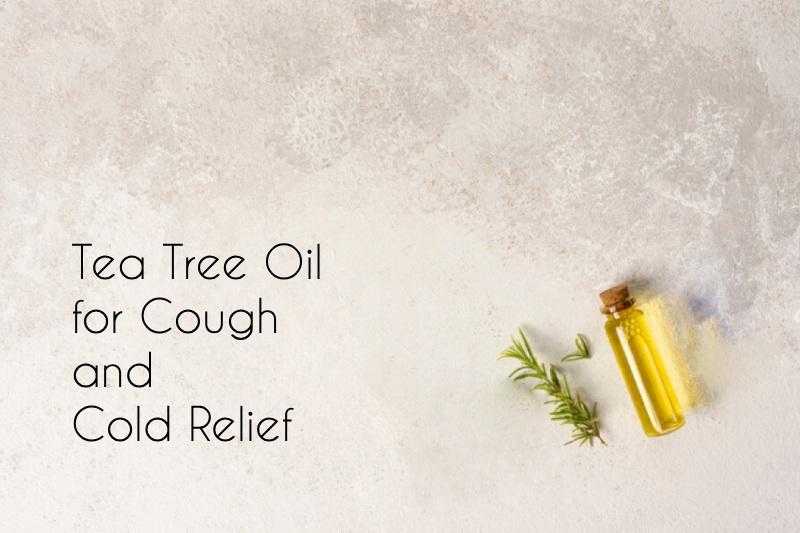Tea Tree Oil For Cough And Cold Relief: Breathe Easy

Tea Tree Oil, extracted from the leaves of the Melaleuca alternifolia tree, has been a staple in natural medicine for its versatile properties. In the quest for relief from cough and cold symptoms, many are turning to this powerful essential Oil. In this article, we'll delve into the role of Tea Tree Oil for Cough and Cold Relief, exploring its origins, antimicrobial wonders, and practical applications for respiratory well-being.
A brief overview of Tea Tree Oil
Tea Tree Oil, renowned for its aromatic and medicinal properties, has gained popularity as a natural remedy for various ailments. Derived from the native Australian plant, Melaleuca alternifolia, this essential Oil has a rich history of traditional use.
In an era marked by a preference for natural alternatives, Tea Tree Oil stands out as a promising solution for those seeking relief from the discomforts of coughs and colds. As we navigate the nuances of this essential Oil, we uncover its potential to offer respiratory comfort without the side effects associated with conventional medications.
Origin and extraction process
To comprehend the efficacy of Tea Tree Oil, it's crucial to understand its origin and extraction process. The Oil is obtained through steam distillation of the leaves, ensuring the preservation of its therapeutic compounds.
Key components for respiratory relief
- Active Components: Essential compounds such as terpinene-4-ol and cineole contribute to the respiratory benefits.
- Antimicrobial Properties: These components exhibit the ability to combat microbes, including bacteria, viruses, and fungi.
- Anti-inflammatory Effects: Active compounds showcase anti-inflammatory properties, reducing inflammation in the respiratory system.
- Expectorant Qualities: The remedy aids in thinning and loosening mucus, easing its expulsion from the airways.
- Overall Relief: The combined properties of these components make for an effective natural solution for respiratory issues, providing relief and supporting the healing process.
Benefits of Tea Tree Oil for Cough and Cold Relief
Let's explore some notable advantages: 
- Antibacterial Properties: Possesses strong antibacterial qualities to combat bacteria responsible for respiratory infections.
- Anti-inflammatory Effects: Exhibits anti-inflammatory properties, reducing inflammation in the respiratory tract and alleviating sore throat.
- Expectorant Qualities: Acts as an expectorant, promoting mucus clearance in the respiratory system to ease congestion and coughing.
- Immune System Support: Supports the immune system, aiding the body in fending off infections that contribute to coughs and colds.
- Relief from Chest Congestion: Inhaling steam infused with it helps relieve chest congestion by loosening mucus, facilitating easier expulsion.
- Cough Suppressant: Acts as a cough suppressant, soothing the throat and reducing the urge to cough.
- Natural Decongestant: Acts as a natural decongestant in aromatherapy or topical applications, clearing nasal passages and easing breathing difficulties.
- Antiviral Activity: Exhibits antiviral properties, assisting in combating viruses that contribute to cold symptoms, potentially reducing illness duration and severity.
How to Use Tea Tree Oil for Cough and Cold Relief
Tea tree oil, with its powerful antimicrobial properties, can be a game-changer in alleviating cough and cold symptoms.
Here's a detailed, step-by-step guide on how to effectively use tea tree oil for Cough and Cold Relief:
Choose High-Quality Oil
Start by ensuring you have a high-quality oil. Look for products that are pure, organic, and preferably have certifications indicating their purity.
Inhalation Method:
Bring a pot of water to a boil and allow it to cool for a brief moment before use.
Mix in 3 to 5 drops of the oil into the water.
Cover your head with a towel and lean over the pot to inhale the steam.
Breathe deeply for 5-10 minutes, allowing the antimicrobial properties of the Oil to reach your respiratory system.
DIY Steam Inhalation:
Fill a bowl with hot water.
Add 2-3 drops of Oil.
Position your face above the bowl and drape a towel over your head.
Inhale the steam deeply, letting the oil-infused steam work its magic on your respiratory system.
 Topical Application for Cough Relief:
Topical Application for Cough Relief:
Mix 2-3 drops of the Oil with a carrier oil like coconut or almond Oil.
Gently massage the blend onto your chest and throat.
The antimicrobial properties can help soothe cough symptoms and clear congestion.
Topical Application for Cold Relief:
Mix 2-3 drops of Oil with a carrier oil.
Apply the blend to your chest, throat, and under your nose.
This can help alleviate cold symptoms and promote easier breathing.
Blending with Other Essential Oils:
Experiment with blending tea oil with other essential oils like eucalyptus or peppermint.
These blends can enhance the effectiveness of the Oil in providing relief from coughs and colds.
Safety Precautions:
Always perform a patch test before applying the Oil topically.
Adhere to the suggested dilution ratios to avoid any potential skin irritation.
If you have sensitive skin or allergies, consult with a healthcare professional before use.
Incorporate Into Daily Routine:
Place several drops of the oil into your diffuser.
Inhale the refreshing aroma regularly to support respiratory health and prevent coughs and colds.
Household Cleaning for Preventive Measures:
Mix the Oil with water and vinegar for an all-natural, antimicrobial cleaning solution.
Wipe down surfaces to create a cleaner environment and reduce the risk of infections.
Consult with a Professional for Children and Seniors:
If considering the Oil for children or seniors, consult with a healthcare professional or paediatrician.
Follow their guidelines on safe usage and appropriate dilution ratios.
Incorporating tea tree oil into your routine with these steps can contribute to a natural and effective approach to managing cough and cold symptoms. Remember to prioritize safety and quality when using essential oils for health purposes.
Conclusion
Recap the key benefits of Tea Tree Oil for cough and cold relief. Reinforce its natural, holistic approach to respiratory wellness.
End the article by encouraging readers to explore the potential of Tea Tree Oil as a natural, effective remedy for respiratory issues. Emphasize the importance of holistic approaches to well-being.
FAQs
Is Tea Tree Oil safe for everyone?
The Oil is generally safe for most people when used appropriately. However, it's advisable to perform a patch test and consult with a healthcare professional, especially if you have allergies or pre-existing conditions.
Is it safe to consume Tea Tree Oil to alleviate cough symptoms?
Ingesting the Oil is not recommended. Its potency can lead to adverse effects. Opt for external methods like inhalation or applying topically for a safe and effective experience.
How often should I use Tea Tree Oil for respiratory relief?
The frequency of use depends on personal preferences and the specific remedy. Follow recommended dilution guidelines and listen to your body's response.
Are there any alternatives to Tea Tree Oil for cough and cold relief?
While the Oil is effective, alternatives like eucalyptus and peppermint oils also offer respiratory benefits. Experiment to find the Oil that works best for you.
Can Tea Tree Oil be used for children with coughs and colds?
Yes, but with caution. Always dilute the Oil properly and use smaller quantities for children. Consult with a pediatrician before use.
Related Articles
- 30 Sep 24
Updating Soon The Episodes
- 30 Sep 24
Storing Essential Oils
- 30 Sep 24
What Are Essential Oils
- 30 Sep 24
Science Of Essential Oils
- 30 Sep 24
Happy To Receive Naari Samman Award
- 30 Sep 24
How Are Essential Oils Obtained?
- 30 Sep 24
Gateway To Africa - Istanbul
- 30 Sep 24
Et Global Indian Leader 2022
- 30 Sep 24
Can Essential Oils Help With Self-Care?
- 30 Sep 24
Pain Remedy Essential Oils
- 30 Sep 24
Asian - African Iconic Brand Awards 2022
- 30 Sep 24
Core & Pure Pain Buster Oil
- 30 Sep 24
Tea Tree Essential Oil From Core & Pure
- 30 Sep 24
Business Icon Award
- 30 Sep 24
